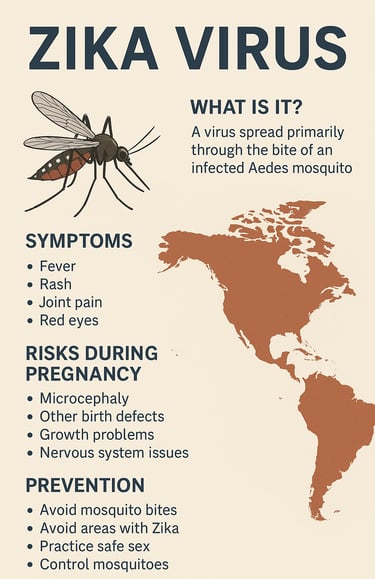Stay updated on what is trending in health. Discover tips and resources for a healthier, balanced life.
Zika Virus: What You Should Know
Discover what the Zika virus is, how it spreads, its symptoms, associated risks during pregnancy, and effective prevention strategies to protect your health.
DISEASES AND CONDITIONS
Dr. S. Ali
6/6/20252 min read


If you've been hearing about the Zika virus and wondering what it is and how it affects people, you're not alone. Zika grabbed global attention a few years ago, especially due to its impact on pregnant women and babies. So, what exactly is Zika, and should you still be concerned? Let’s break it down in a simple, friendly way.
What Is the Zika Virus?
Zika virus is a mosquito-borne virus primarily spread by the Aedes aegypti mosquito — the same mosquito that spreads dengue, chikungunya, and yellow fever. The virus was first identified in Uganda in 1947, but it only started making headlines globally around 2015–2016 during a large outbreak in the Americas.
How Do You Get Zika?
The most common way people get infected with Zika is through the bite of an infected mosquito. But that’s not the only way — it can also spread through:
Unprotected sex with someone who has the virus
Blood transfusion (rare)
From mother to baby during pregnancy
This last one is especially serious because Zika can cause severe birth defects in unborn babies.
Common Symptoms of Zika
Many people infected with Zika don’t even realize they have it. If symptoms do appear, they’re usually mild and can include:
Fever
Rash
Joint or muscle pain
Headache
Red eyes (conjunctivitis)
These symptoms usually show up 2–7 days after being bitten and go away in about a week.
Why Is Zika a Big Deal?
For most people, Zika isn’t dangerous. But for pregnant women, the stakes are much higher. Zika has been linked to a serious birth defect called microcephaly, where a baby is born with a smaller-than-normal head and underdeveloped brain.
It can also cause other complications in infants, including:
Eye defects
Hearing loss
Growth problems
Neurological issues
That’s why health officials strongly advise pregnant women to avoid traveling to Zika-affected areas.
Where Is Zika Found?
Zika is mostly found in tropical and subtropical regions, including parts of:
South and Central America
The Caribbean
Southeast Asia
Africa
Some areas of the Pacific Islands
Outbreaks can happen when the mosquito that carries Zika is present and able to thrive — usually in warm, humid environments.
How to Protect Yourself
There’s no vaccine or specific treatment for Zika at the moment, so prevention is key. Here's what you can do:
Avoid mosquito bites: Use insect repellent, wear long-sleeved clothes, and stay in air-conditioned or screened-in areas.
Avoid travel to Zika-affected areas, especially if you're pregnant or planning to conceive.
Use protection during sex, especially if your partner has traveled to or lives in an area with Zika.
Control mosquitoes at home: Remove standing water in flowerpots, buckets, and other containers where mosquitoes breed.
Is There a Cure for Zika?
There is no cure, but most people recover fully without needing special medical treatment. Rest, fluids, and over-the-counter pain relievers (like acetaminophen) are usually enough. However, always consult a doctor, especially if you're pregnant or have other health concerns.
Final Thoughts
While Zika isn't making headlines as often these days, it’s still important to stay informed — especially if you live in or plan to travel to areas where the virus is present. Awareness and prevention remain the best ways to protect yourself and your loved ones.
Looking for more health updates like this?
Visit more pages of PulseYourHealth.com for trustworthy, easy-to-understand articles on diseases, wellness tips, and more.
Sources:
Centers for Disease Control and Prevention (CDC)
https://www.cdc.gov/zika
World Health Organization (WHO)
https://www.who.int/news-room/fact-sheets/detail/zika-virus
Mayo Clinic – Zika Virus
https://www.mayoclinic.org/diseases-conditions/zika-virus
MedlinePlus (U.S. National Library of Medicine)
https://medlineplus.gov/zikavirus.html
Pulse Your Health
Empowering you to achieve your health goals.
Contact
© 2026. All rights reserved.
Disclaimer: The content on this website is for informational purposes only and is not medical advice. Always seek the advice of your physician or other suitably qualified healthcare professional for diagnosis, treatment and your health related needs.
